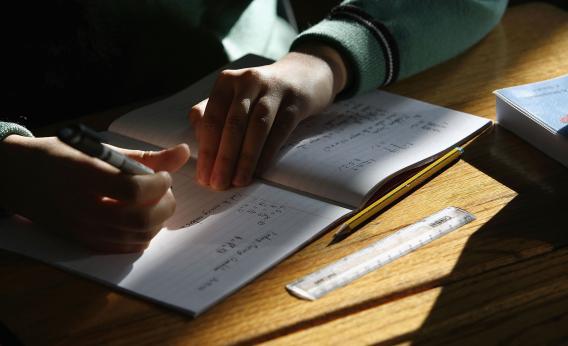Read more from Slate’s special issue on science education and give us your best ideas for raising the next generation of scientists and engineers.
Schools have tried for years to encourage girls to explore careers in math and science, yet a stubborn gender gap in the STEM fields persists.
But new research might have an explanation: The messages we take in about our gender—like the old refrain that girls aren’t as good as boys at science–can influence the way we perform.
Believing you have innate qualities that make you good or bad at something—called “entity theories”— can change the way you handle a difficult task, psychologists have theorized. Children who adopt entity theories about a skill, like math or science ability, are likely to perform worse when challenged at those activities because they think their skills are inborn and are therefore less likely to put in energy and hard, constructive work.
A study published recently in Psychological Science, led by a researcher from the University of Illinois at Urbana-Champaign, takes this idea a step further by suggesting that children can adopt these beliefs from information they hear about their gender (and, presumably, about other social categories, too). Telling a boy he’s destined to be good at math might encourage him to coast; meanwhile, telling a girl that girls aren’t good at math, the theory dictates, will not motivate her to work hard to overcome that adversity. A girl who hears that “girls are bad at math” can internalize that message, believe she is bad at math, and do worse at math because of it.
To test this theory, 144 children, ages 4 to 7, played a game in which they looked at pictures of 3-D blocks shown from different angles, then matched pairs of images that showed the same block from a different perspective.
After one round, the adult leading the experiment told some children that the other gender group was successful at that game (so girls heard, “Boys are good at this game”). A second group was told about other individuals’ skills (“That girl is good at this game”), and a third group heard no further information..
Then the children played a second, more difficult round. The scores of those who were given the gender prompts fell by an average of 12.8 percent. By contrast, children who were told about another individual child’s success or failure stayed about the same. Scores fell 2.9 percent among the kids who heard nothing.
These changes in behavior speak volumes about stereotypes that children absorb from those around them: In this case, a relative stranger appears to have had an immediate effect on how children approached the task at hand.
Luckily, it also points to how adults can curb these effects among girls and boys alike: teaching the value of persistence and working hard.
Also in Slate’s special issue on science education: Fred Kaplan explains why another “Sputnik moment” would be impossible; Philip Plait explains why he became the “Bad Astronomer”; Paul Plotz describes how almost blowing up his parents’ basement made him a scientist; Tom Kalil says that the Obama administration is using the Make movement to encourage science education; and Dana Goldstein explains why you should make your daughter play video games. Also, share your ideas for fixing science education in the Hive.
